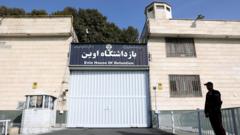A cease-fire agreement between Israel and Iran, brokered by President Trump, faces immediate accusation of violations, casting doubt on its longevity and the prospects for peace.
Cease-Fire Fracas: Renewed Tensions Between Israel and Iran

Cease-Fire Fracas: Renewed Tensions Between Israel and Iran
Conflict resumes as allegations of cease-fire violations emerge, raising international concerns.
With reports on June 24, 2025, the Israeli government accused Iran of breaking a cease-fire that was supposedly established just hours prior. President Trump announced the agreement on social media, claiming that both nations had committed to a "complete and total cease-fire" starting at 7 a.m. local time in Israel. However, skepticism grew as Iranian state media confirmed the deal, while the Israeli military reported ongoing missile launches from Iranian territory.
The timeline took a rapid turn when, shortly after confirming the cease-fire, the Israeli military detected further missile activity. Senior Israeli officials responded firmly, stating their intent to retaliate against any provocative actions, despite Iranian official reports denying the missile launches attributed to them.
The proposed cease-fire aimed to conclude hostilities that had escalated over the previous week. Trump praised both nations for negotiating an end to the conflict, suggesting that military operations would wrap up within 24 hours post-cease-fire.
These developments amplify fears of a renewed conflict in a region already rife with instability. Observers have raised concerns over the viability of negotiations and the broader implications for U.S. foreign policy in the Middle East, particularly given the contentious history between Israel and Iran.
As the situation evolves, the international community watches closely, balancing hope for peace with the reality of ongoing tensions. The next steps from both nations will be crucial in determining whether this cease-fire can genuinely hold or if military confrontations will flare once again.
The timeline took a rapid turn when, shortly after confirming the cease-fire, the Israeli military detected further missile activity. Senior Israeli officials responded firmly, stating their intent to retaliate against any provocative actions, despite Iranian official reports denying the missile launches attributed to them.
The proposed cease-fire aimed to conclude hostilities that had escalated over the previous week. Trump praised both nations for negotiating an end to the conflict, suggesting that military operations would wrap up within 24 hours post-cease-fire.
These developments amplify fears of a renewed conflict in a region already rife with instability. Observers have raised concerns over the viability of negotiations and the broader implications for U.S. foreign policy in the Middle East, particularly given the contentious history between Israel and Iran.
As the situation evolves, the international community watches closely, balancing hope for peace with the reality of ongoing tensions. The next steps from both nations will be crucial in determining whether this cease-fire can genuinely hold or if military confrontations will flare once again.




















